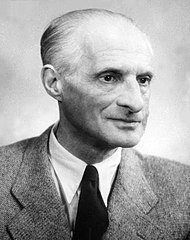Julian Tuwim
| Julian Tuwim | |
|---|---|

Julian Tuwim
|
|
| Born |
September 13, 1894 Łódź, Congress Poland |
| Died | December 27, 1953 (aged 59) Zakopane, Poland |
| Occupation | Poet |
| Nationality | Polish |
| Ethnicity | Jewish |
| Literary movement | Skamander |
| Notable awards | Golden Laurel of the Polish Academy of Literature |
| Spouse | Stefania Tuwimowa (since 1919) |
| Children | Ewa Tuwim-Woźniak (adopted) |
| Relatives |
Irena Tuwim (sister, a poet herself) Kazimierz Krukowski (cousin) |
Julian Tuwim (September 13, 1894 – December 27, 1953), known also under the pseudonym "Oldlen" as a lyricist, was a Polish poet of Jewish descent, born in Łódź, (then part of the Russian Partition). He was educated in Łódź and in Warsaw where he studied law and philosophy at Warsaw University. After Poland's return to independence in 1919, Tuwim co-founded the Skamander group of experimental poets with Antoni Słonimski and Jarosław Iwaszkiewicz. He was a major figure in Polish literature, admired also for his contribution to children's literature. He was a recipient of the prestigious Golden Laurel of the Polish Academy of Literature in 1935.
Tuwim was born into a family of assimilated Jews. The surname comes from the Hebrew tovim (טובים) meaning "good". His parents, Izydor and Adela, provided Julian with a comfortable middle class upbringing. He was not a particularly diligent student and had to repeat the sixth grade. In 1905 the family had to flee from Łódź to Wrocław (Breslau) in order to escape possible repercussions following Izydor's involvement in the Revolution of 1905.
Initially Tuwim's poetry, even more than that of the other "Skamandrites", represented a decisive break with turn-of-the-20th-century mannerism. It was characterized by an expression of vitality, optimism, in praise of urban life. His poems celebrated everyday life in the city, with its triviality and vulgarity. Tuwim often used vernacular language in his work, along with slang as well as poetic dialogue.
...
Wikipedia
